Some posts on this site contain affiliate links. If you book or buy something through these links, I earn a small commission (at no extra cost to you). Take a look at my privacy policy for more information.
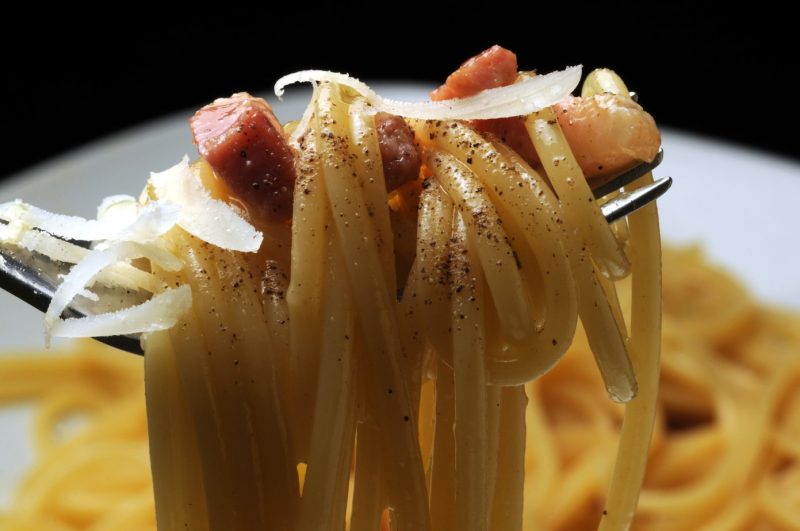
Welcome to my Rome food guide – a round-up of some of the must-try traditional dishes to help you discover the best of Roman cuisine…
When I visited Rome in January, the main thing I wanted to do was eat. And boy did I do that! I genuinely think I might have caused a national gelato shortage while I was there. There was even one wonderful day where I had two lunches in the space of about two hours.
Think of Italian food and chances are you’re thinking of pasta, pizza, bolognese, lasagna, and maybe some tiramisu. And yes, those foods can be found all over the country.
But Italian food is actually quite regional: each area of the country has its own unique cuisine, influenced by its history, culture, and by the kinds of ingredients it produces. The food in Rome is pretty different to the food in Bologna or Naples, for example.
Rome is no different, and the city has several unique dishes which must be added to any visiting foodie’s wishlist. Read on for the 14 foods you have to try in Rome, plus suggestions for where to try them…
READ MORE: How to Spend 2 Days in Rome
14 Must-Try Foods in Rome
1. Artichoke
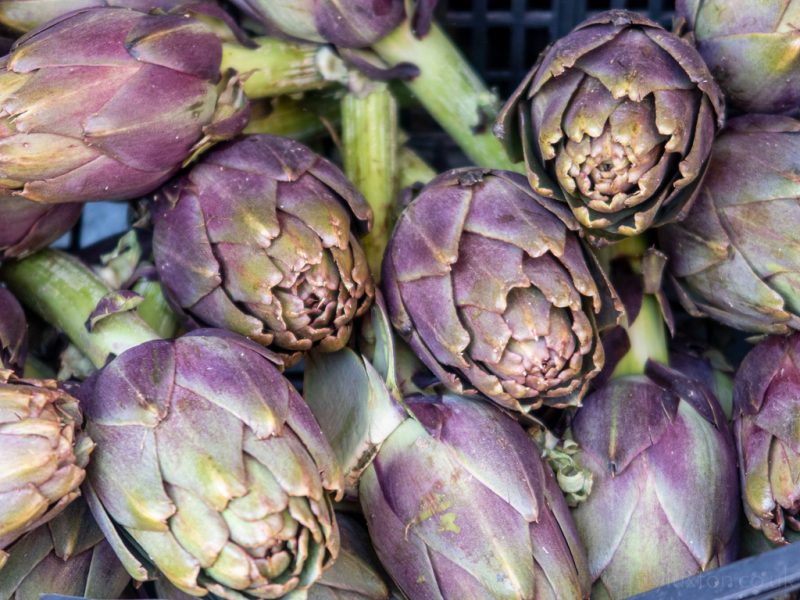
Artichokes have been a staple of Roman cuisine for centuries – right back to the days of the Ancient Romans, in fact. They grow in the surrounding region of Roman Campagna, and are ubiquitous in the city. You’ll spot them piled high at vegetable stalls in the markets, and chances are they’ll appear on the menu at pretty much every restaurant you sit down in!
There are two traditional artichoke dishes to try in Rome. Carciofi alla giudia, or Jewish-style artichoke, has its origins in the Jewish Ghetto of the city, and dates from at least the 16th century. The artichokes are beaten until nearly flat, deep-fried, and seasoned with salt and pepper.
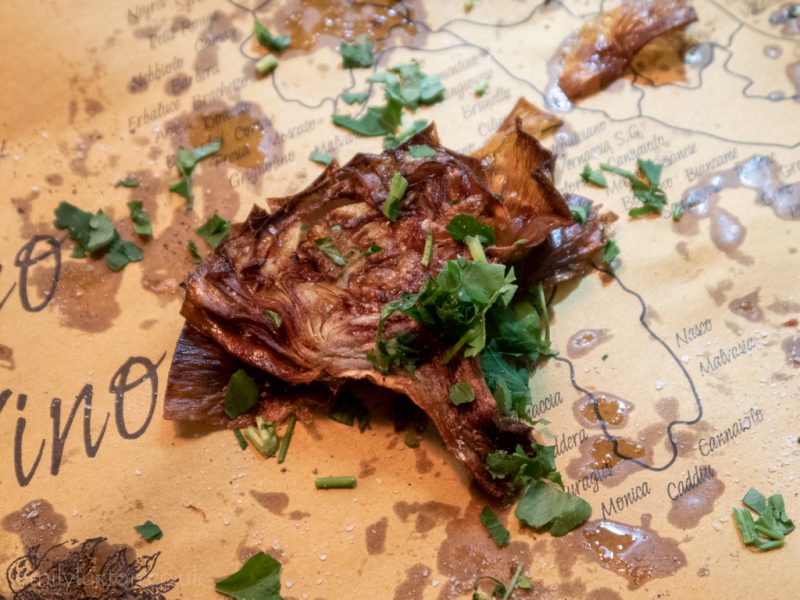
Carciofi alla romana, or Roman-style artichokes, is also a super common food in Rome. Artichokes are hollowed out, stuffed with garlic, parsley, and mint, and slow-braised in water for about an hour, until soft all the way through.
2. Suppli
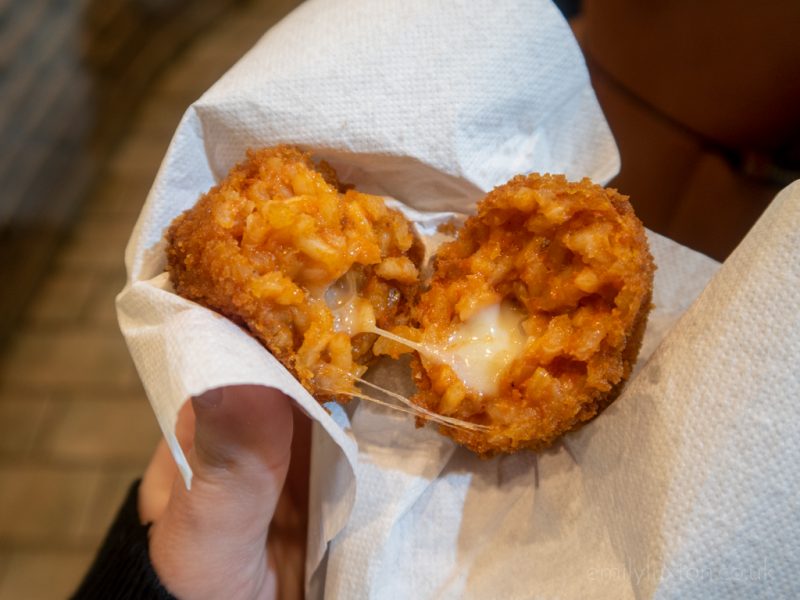
Suppli is a street food snack that you’ll always see in Rome food guides. Similar to arancini, suppli are balls of rice mixed with tomato sauce – and sometimes meat – usually with a gooey mozzarella centre. They’re breaded and deep-fried for a hot, tasty snack. You’ll spot lots of varieties – I even tried a spaghetti one!
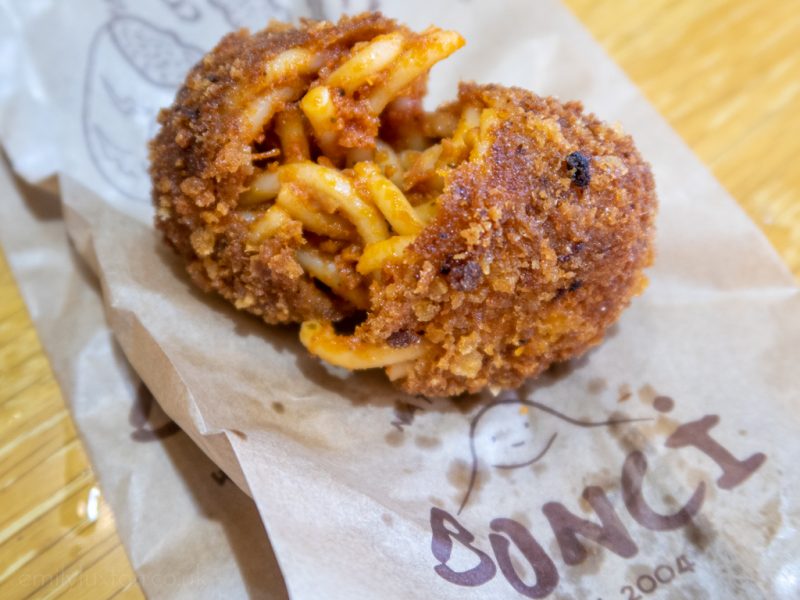
Where to Try Suppli in Rome
Almost every deli and pizza shop in Rome sells suppli, so they’re easy to find. The best ones I tried came from Panificio Bonci, not far from the Vatican.
- Supplizio – 143 Via dei Banchi Vecchi, 00186 Roma
- Panificio Bonci – 36 Via Trionfale, 00195 Roma
- Imperivm Pizza – 75/76 Via Arenula, 00186 Roma
3. Roman Salami
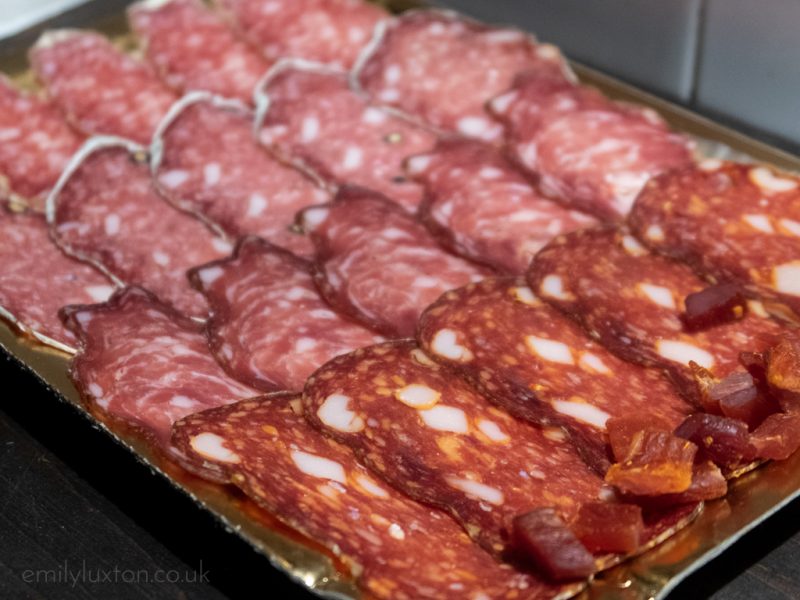
Italians have, by all accounts, been eating salami since before ancient Roman times. There’s a huge variety of cured meats, salamis, and other sausages to try, but if you’re on the hunt for local cuisine, look for corallina Romana and schiacciata Romana. Both are traditional Roman varieties of salami that deserve a spot on any Rome food guide!
Where to Try
Norcineria Viola, 43 Piazza Campo de’ Fiori, 00186 Roma. A historic little shop dating from 1890, with an incredible array of cured meats, cheeses, and salamis on offer.
4. Pizza al Taglio
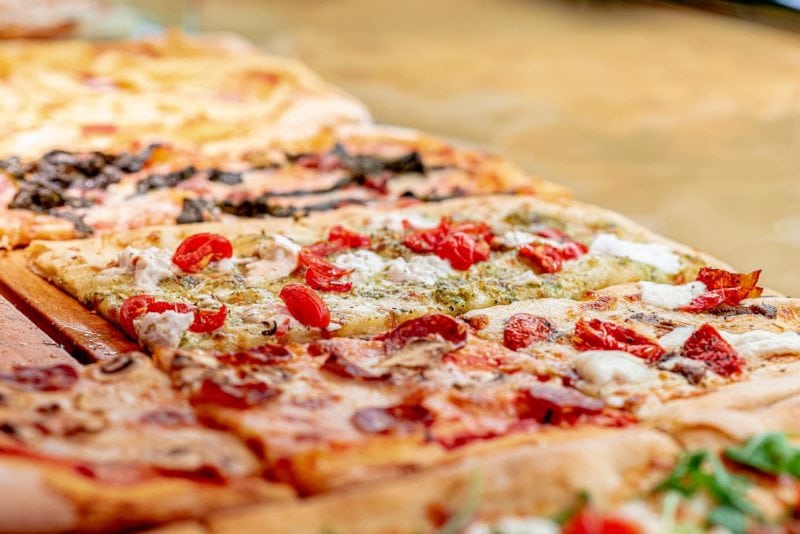
Pizza al taglio means pizza by the slice, and is probably more popular in Rome than regular pizza. It’s baked in huge square trays, then sliced into a (pretty big) rectangular chunk for you to takeaway, or eat at a standing table outside. Slices are usually sold by weight.
There are always plenty of toppings to choose from. Two popular local varieties are pizza rossa – topped with red sauce and nothing else – and pizza bianca, which has no sauce and is instead seasoned with olive oil, rosemary and garlic. Locals often use pizza bianca to make a sandwich, stuffing it full of hot roast pork, or cured meats and cheese.
Where to Try
You can find a pizza al taglio place on almost every street in Rome, or at least it felt that way to me! Ask a local for a nearby recommendation, or just pop into one that looks good. I liked these spots…
- Pizzarium by Gabrielle Bonci – 43 Via della Meloria, 00136 Roma
- Antico Forno Roscioli – 34 Via dei Chiavari, 00186 Roma
- Grano, Frutta e Farina Bistrot – 49A Via della Croce, 00187 Roma
5. Cacio e Pepe
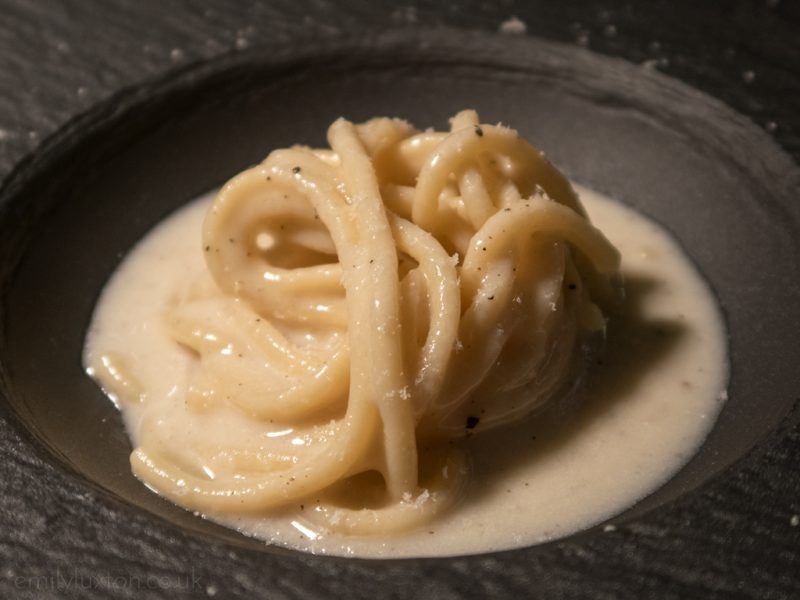
If there’s one dish you’re sure to find on every Rome food guide, it’s cacio e pepe. The name translates as “cheese and pepper”, and like many Roman pasta dishes, it’s an incredibly simple recipe.
Cacio e pepe is usually made with just three ingredients: black pepper, pecorino romano cheese, and pasta. The noodles are normally tonnarelli, although spaghetti is sometimes used. There seems to be a lot of debate about how cacio e pepe should be made, so you may find variations across the city.
Where to Try Cacio e Pepe
I tried my cacio e pepe at La Terrasse Restaurant on the top floor of the Sofitel in Rome (as part of a gifted meal).
6. Pasta Alla Gricia
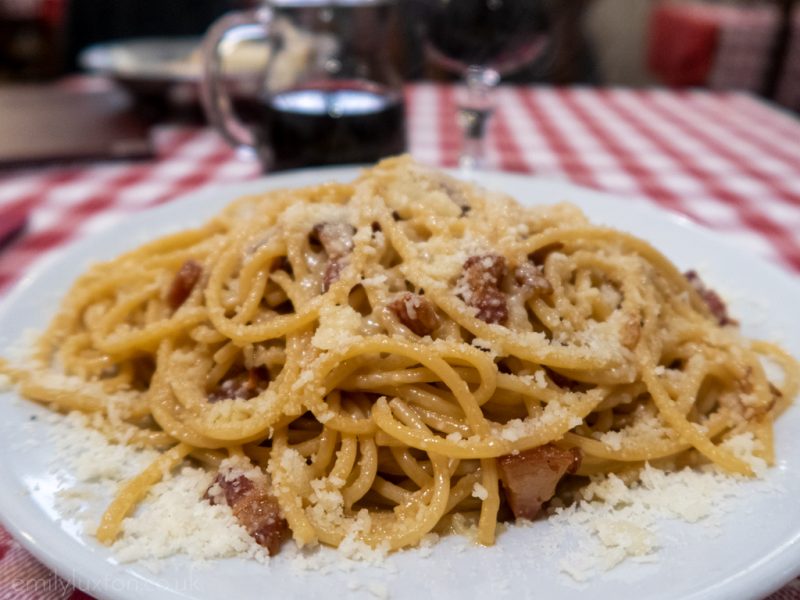
Like cacio e pepe, pasta alla gricia is another super simple pasta dish involving just a handful of ingredients.
Another iconic food in Rome, pasta alla gricia combines pasta – usually spaghetti, or sometimes bucatini – with just two other ingredients. Guanciale – cured meat from pork jowl or cheeks – and grated pecorino cheese. The simplicity of the dish lets those strong, earthy flavours really stand out – and although it looks quite plain, it’s anything but.
Where to Try Pasta Alla Gricia
I had mine at Da Sergio (27 Vicolo delle Grotte, 00186 Roma) a rustic little trattoria with red-checked tablecloths and a menu full of classic Roman food.
7. Bucatini Amatriciana
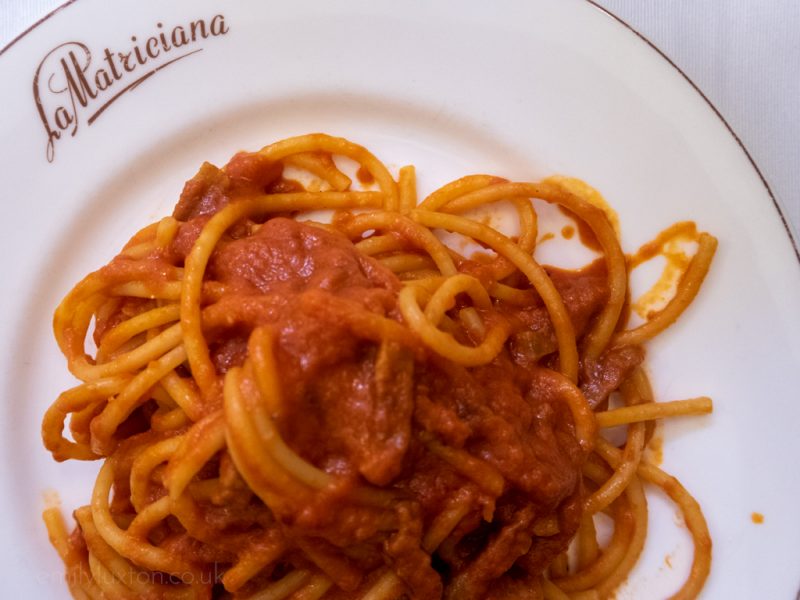
One of the best meals I had in Rome was the bucatini amatriciana from La Matriciana, a historic restaurant in the Termini district.
Simple really is the name of the game with Roman pasta dishes. This one involves a thick tomato sauce made with white wine and dried red chillies, chunks of guanciale pork, and bucatini pasta. These are thick, spaghetti-like noodles with a long hole through the middle. It’s really hard to eat, and I made a massive mess of mine, but the rustic flavours were so good I just didn’t care!
Where to Try Bucatini Amatriciana
La Matriciana, 44 Via del Viminale, 00184 Roma. As the restaurant’s name suggests, this dish is their speciality!
8. Carbonara
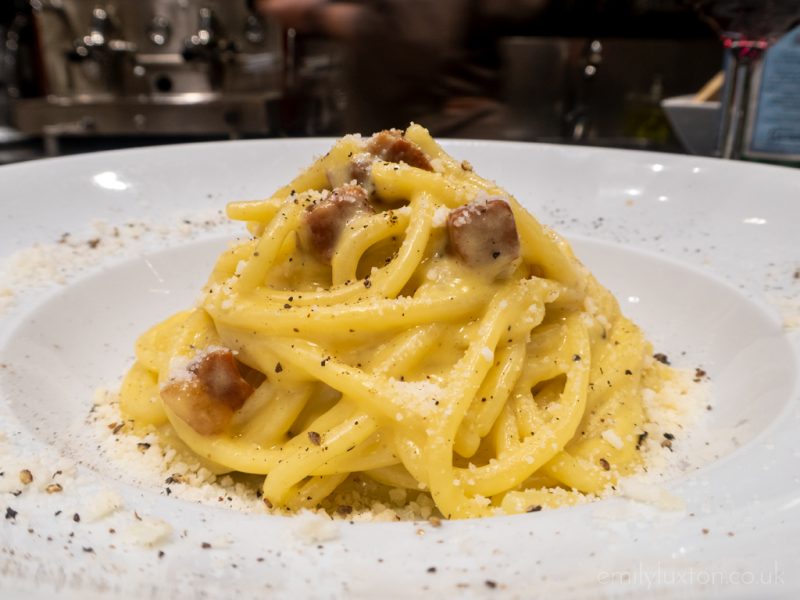
You might be surprised to learn that carbonara is actually quite a new dish on the Rome food scene! No records of it exist from before the Second World War, and it’s thought to have been invented after the Allied forces ousted the Germans from Rome and distributed rations – among them large amounts of bacon and powdered eggs.
Whatever the origin story, there’s no denying that carbonara is an iconic part of Rome’s cuisine. Similar to pasta alla gricia, it’s made with guanciale (although many use pancetta, causing endless debate), pecorino cheese, black pepper, and egg yolk. Its actually the egg which gives carbonara its creamy texture, rather than any cream (turns out I’ve been making it wrong for years!).
Where to Eat Carbonara in Rome
Several people recommended Roscioli (21 Via dei Giubbonari, 00186 Roma) to me before I went. I wasn’t disappointed; my meal was exquisite! FYI – you need to book a table as the restaurant is extremely popular, but you can book online which makes things easier. If you’re travelling solo, book a seat at the bar. Alternatively, Baccano near the Trevi Fountain also serves a top-notch carbonara!
9. Saltimbocca alla Romana
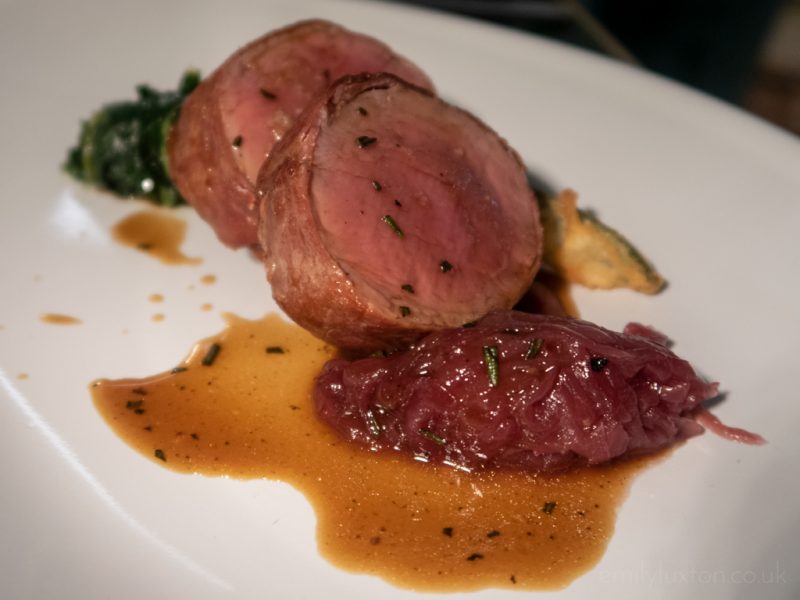
Saltimbocca alla Romana is an absolute must-try food in Rome. The name literally translates to “jumps in your mouth”, a testament to the flavour of this Roman classic. Saltimbocca is popular in several countries, but the Roman style is thought to be the original version of the dish.
The dish is another relatively simple one, consisting of veal, prosciutto and sage, rolled up and pan-fried in dry white wine and butter.
10. Allesso di Scottona
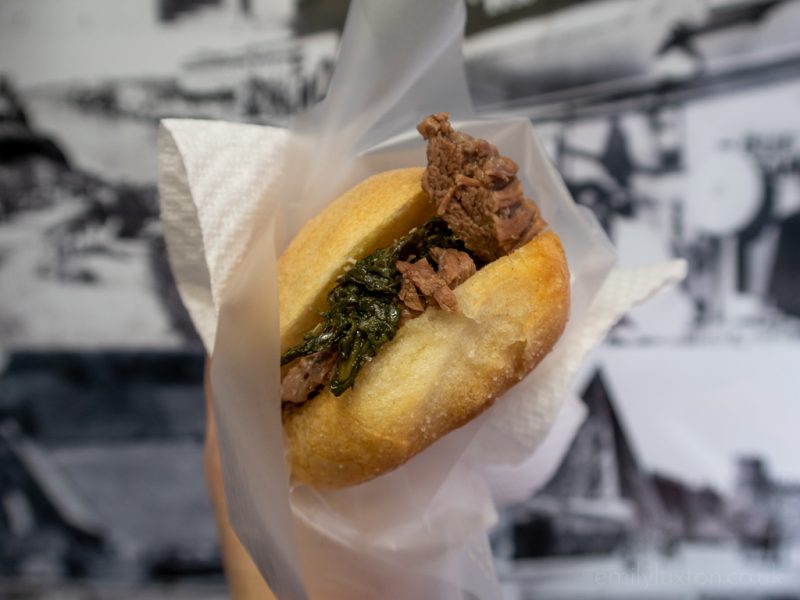
Another of my favourite meals I had in Rome was this incredible sandwich, the panino con allesso di scottona from Mordi e Vai in Testaccio Market (Box 15).
Allesso means simmered, and scottona is a type of beef known for its tenderness. Slow-cooked beef dishes like this were, at one time, very popular in Rome as a way to tenderize tough cuts of meat. The retired butcher behind Mordi e Vai is bringing it back into fashion at his (now incredibly popular) stall in the market.
Take a number, wait your turn, and order the “number 4” if you want the simmered beef. It’s served with braised chicory, another traditional Roman ingredient, and one piece of the bread is dipped in the meat’s sauce to soften it up for you. The result is a messy, sloppy, chunk of deliciousness that you won’t want to miss.
11. Porchetta
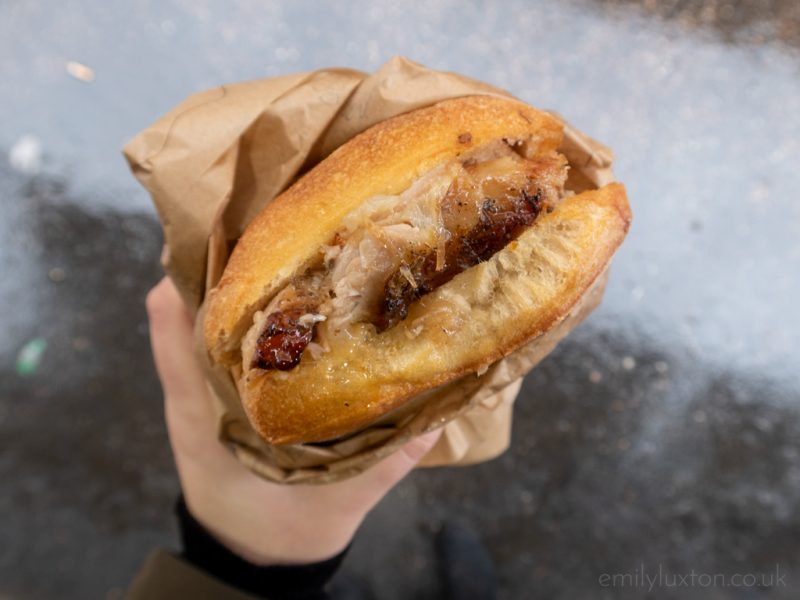
Porchetta is a boneless pork roast that’s popular across Italy, but originated in the province of Rome. Today, it’s a popular street food and a common filling for pizza bianca.
The meat is seasoned with plenty of herbs, wrapped in its rind, and cooked over a wood fire for several hours. This is then cut into chunks and served between two slabs of pizza bianca for a delicious, hearty sandwich – perfect fuel as you explore the city!
Where to Try
Panificio Bonci (36 Via Trionfale, 00195 Roma) makes one of the best porchetta sandwiches in Rome, but they only serve it on Saturdays. In the Centro Storico, La Salumeria (Via del Banco di Santo Spirito).
12. Maritozzi

Maritozzi are a classic Roman breakfast pastry, which you’ll struggle to find anywhere else! I’d never heard of them until I started researching this trip.
It’s a sweet yeasted bun similar to brioche bread, served with whipped fresh cream. The name is a derision of the Italian word for husband, because they were traditionally given by betrothed young men to their fiancées, with “maritozzi” meaning, essentially, “almost husband”.
13. Gelato

Although not exclusive to Rome, gelato is everywhere in the city – and there are some seriously good, artisanal gelaterias to try.
Not all gelato is created equal, so be sure to check out my round-up of the best places to try gelato in Rome. A few of my favourites were Fatamorgana, Neve di Latte, and Günther.
14. Roman Wines

No trip to Italy is complete without a few glasses of vino. While you may be better-acquainted with wines from the regions of Veneto, Piedmont, and Tuscany, the region of Lazio, surrounding Rome, is also a wine-growing area. It’s less well-known simply because it’s less exported, with most of it ending up in the city of Rome.
Wines from the communes directly surrounding Rome are collectively known as Castelli Romani, and are mostly white. The most famous of these is Frascati. They’re best known for their dry white table wines, which you’ll spot on many menus in Rome, but they also produce sparkling wines which are perfect for pre-dinner drinks in the sunshine.
What to Expect from Food in Rome: Ingredients and Flavours
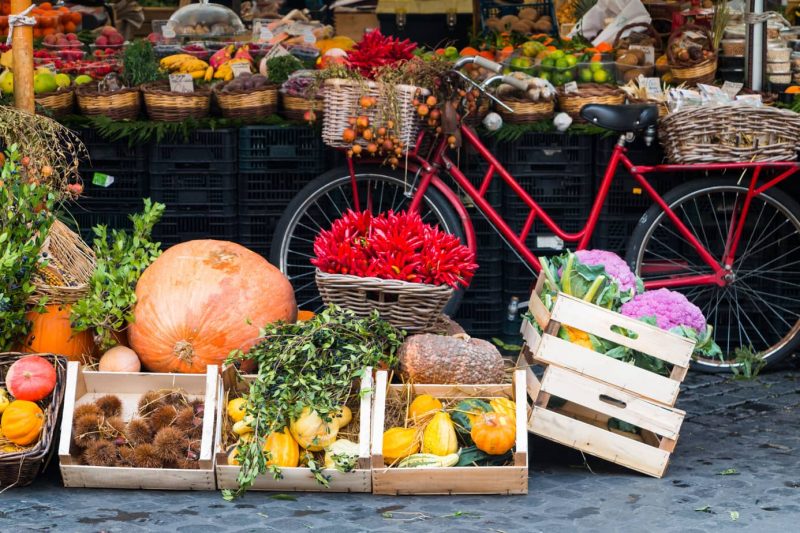
Roman food, as you may have guessed, is often about simple dishes prepared using a handful of top-quality seasonal ingredients. The food is hearty, and full of rich, earthy flavours despite the simplicity of many dishes.
Traditionally, food has come from the surrounding lands of Roman Campagna, a part of Lazio region. Common ingredients include globe artichokes, peas, and fava beans, as well as cheeses including the popular Pecorino Romano. Meat-wise, the area is rich in shellfish, lamb, and pork dishes. The most common pasta shape you’ll find in Rome is generally spaghetti or some variation of it, such as bucatini or tonnarelli.
Historically, Roman cuisine was influenced heavily by the Ancient Greek diet. Later the city was a centre of high cuisine during the Italian renaissance, largely due to the fact that some of the best chefs of the time worked for the popes. There’s also a considerable Jewish influence on the food in Rome thanks to the large Jewish quarter.
Best Food Tours in Rome
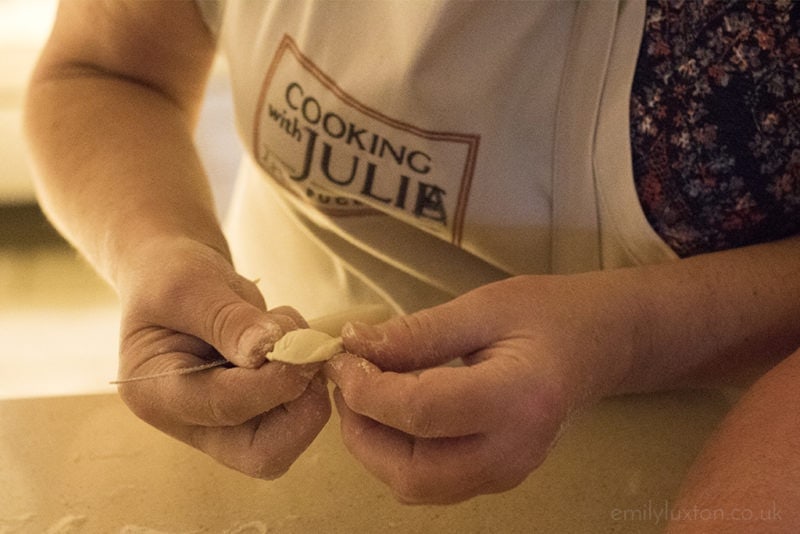
Nothing beats a good food tour or cooking class! They are simply the best way to learn more about a new destination’s cuisine. Especially if you find a good one run by a local expert. Eat your way around the best street foods, or learn to make pasta under the tutelage of a local chef.
I’ve rounded up a few of the top-rated food tours in Rome from my preferred company, Get Your Guide. I actually booked one myself when I was in the city. If you book anything I recommend in this section, I’ll make a small commission – without affecting the price you pay at all.
- Rome Street Food Tour with Local Guide (I did this one)
- 4 Hour Food Tour by Night
- Trastevere 3 Hour Street Food Tour
- Private Food Tour with 10 Tastings
- Jewish Ghetto & Campo de Fiori by Night Food Tour
- Pasta Cooking Class in the Kitchen of Mamma
- Pasta & Tiramisu Workshop with Dinner
- Make Your Own Pizza Cooking Class & Dinner
- 4-Hour Combo Pizza and Pasta Cooking Class
- Rome Pasta-Making Class
Rome Food Guide: The Quick Version
Here’s the short list of all the dishes you absolutely MUST try when in Rome! If you want to know more about them – you’ll need to read the article above! Buon appetito…
- Artichoke
- Suppli
- Roman Salami
- Pizza al Taglio
- Cacio e Pepe
- Pasta Alla Gricia
- Bucatini Amatriciana
- Carbonara
- Saltimbocca alla Romana
- Allesso di Scottona
- Porchetta
- Maritozzi
- Gelato
- Roman Wine
READ MORE: Is Rome Safe for Solo Female Travellers?
Is there anything else you’d add to this Rome food guide? Scroll down to leave a comment!
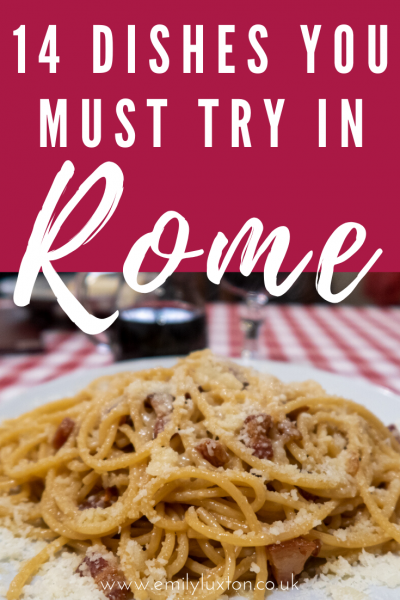

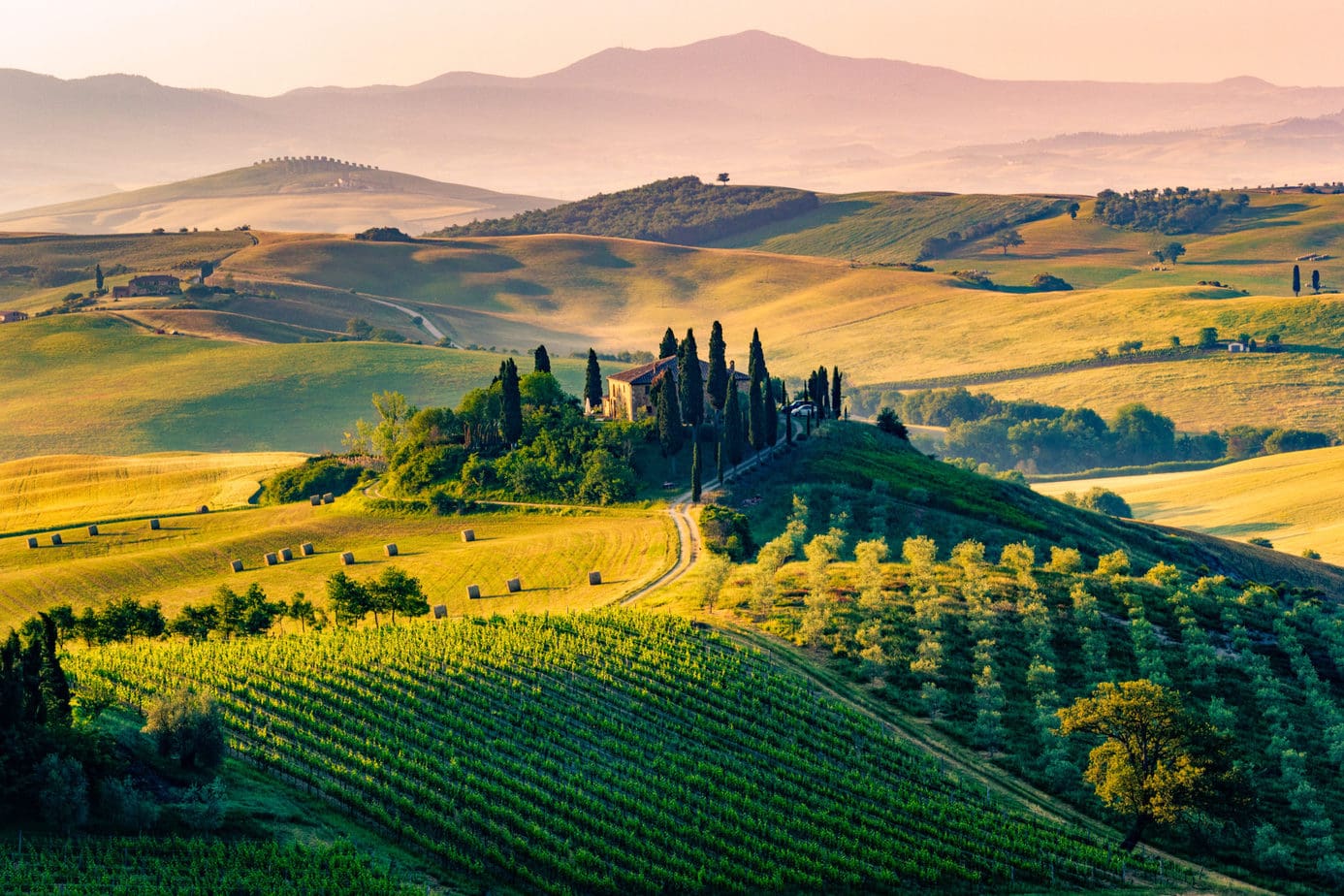
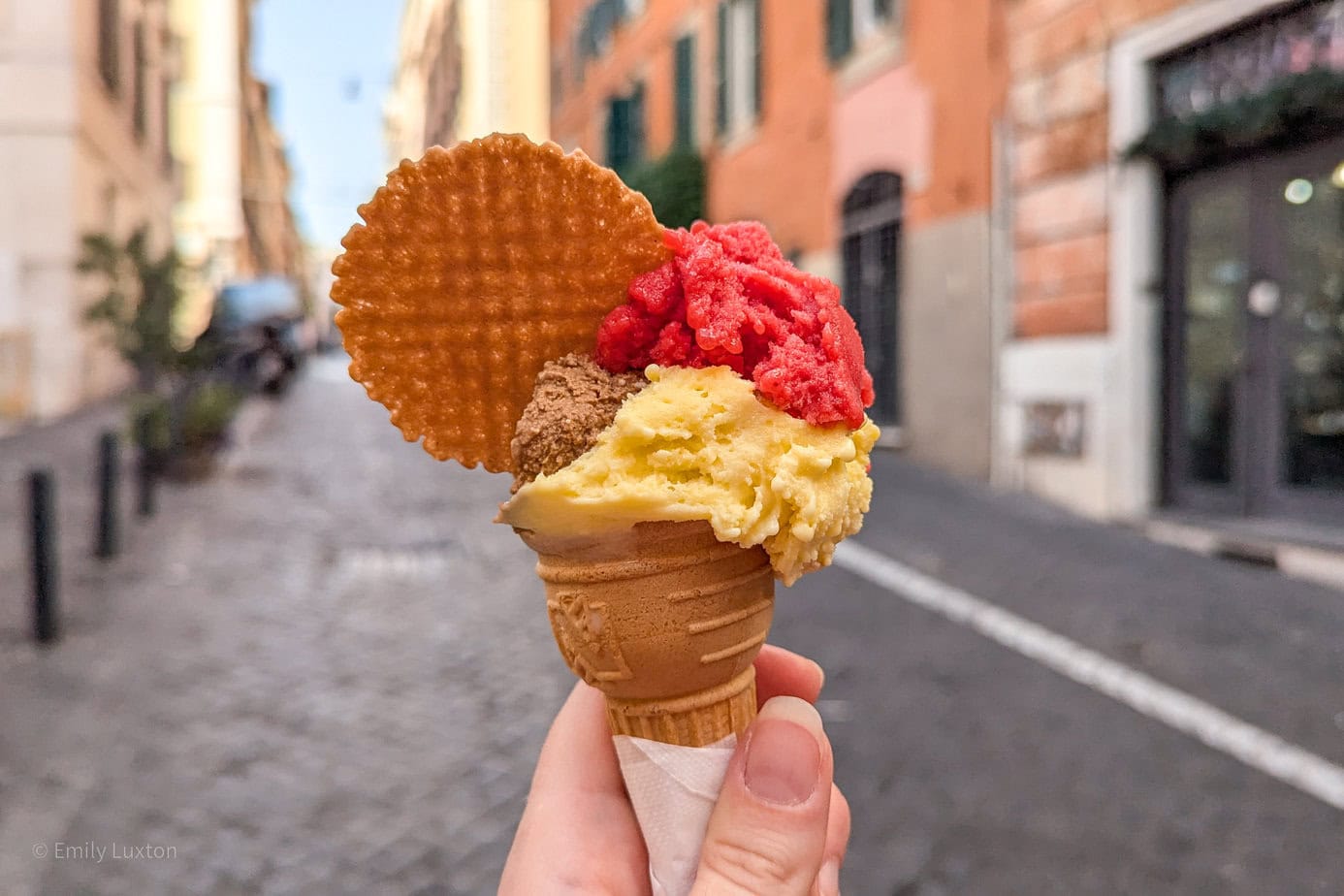

I wish I’d had this guide before I visited Rome – unfortunately I fell for the tourist traps.
Oh no! To be fair – I don’t think there’s such a thing as a bad meal in Rome, even in a tourist trap! Hopefully you managed to try at least a couple of these dishes!
I definitely need to try a Maritozzi, if they’re anything like Gregg’s cream donuts then I’m sold! ?
I’ve not had a Gregg’s cream doughnut but I don’t think they are. It’s more like a brioche bun stuffed with cream! They are VERY good though!
Great post and very well researched. Next time you visit, pop up to Frascati as, as you said, “Traditionally, food has come from the surrounding lands of Roman Campagna”, that’s it ! A lot of vegetables in Roman cuisine were grown by farm hands amongst the vineyards to supplement their income, we are very veggie orientated up her in Frascati (only 25 mins on the train from central Rome). In fact, I would say that most of the food you mention you can find within a few hundred metres in Frascati too. If anyone would like a free pdf foodie guide of the Castelli Romani (no sign up needed, just grab it!) It is here https://www.easyfrascati.com/foodieguidecastelliromani.html
If you are up this way (say up because a little bit up hill!) drop me a line and I shall show you around. I am also a guide in a gorgeous winery! Michelle
ps, the link to Frascati wines is a little bit out of date I think as she mentions 2007 vintage, check out that website I mentioned. Look forward to your next post.
Thanks for the feedback Michelle – so glad you liked the post! Next time I come I definitely want to explore the region around Rome as well as the city – I feel like I left a lot to come back to!
Such a nice tourist place. This is amazing city in italy. I would to try in food recipe.
I want to try learning to cook a few of these too. I’ve always made carbonara with cream, so I definitely need to learn the correct method!
Thanks for sharing this Emily – I LOVE Rome and visited about 3 times, but there are still lots of things on this list I’ve not tried before!
All the more reason to go back!! I spent a lot of time researching food before my trip as it was basically my only reason for going to Rome – most lists had different stuff on so I compiled all my findings into one :)
Thanks for sharing the best travel in Rome exploring the wonderful travel experience with delicious food taste in Italy.
Thanks for reading!
Hi Emily,
Greeting for this great article, we also again planed for the Rome holidays in August 2020. I think we t=really want to try these recipe from best point.
Ooh how exciting! I hope you get to try them all :)
Oh my goodness! I’m so hungry after reading this! I visited Rome two years ago and the food was one of the highlights of my trip. My best tip is to eat where there are lots of locals. Trastevere was a great area for restaurants. I can vouch for the gelato at Fatamorgana’s, we returned for more. I need to save this post for when I go back to Rome so I remember to try all of the things I missed last time!
Same here – I ate so much I felt like I had to roll to the airport!! Glad you enjoyed the post – hope it comes in handy when you next visit Rome :)